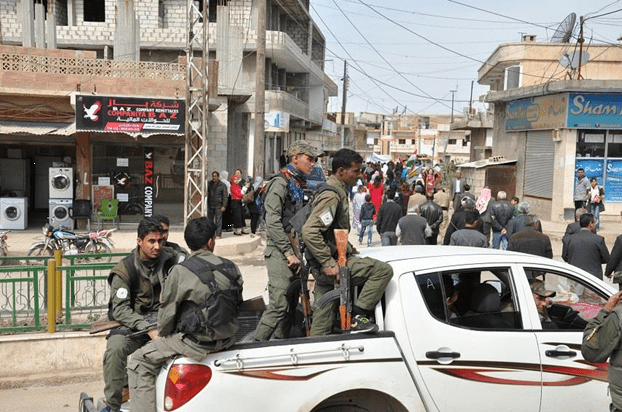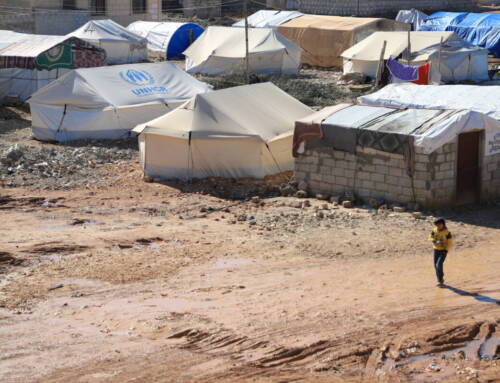Son of pro-Barzani Kurdish family explains why he crossed ideological line to work in Asayish
In Syria’s de facto autonomous Kurdish territories running along the […]
3 May 2017
In Syria’s de facto autonomous Kurdish territories running along the border with Turkey, a major political fault line persists.
The Self-Administration governing the territories is dominated by the Kurdish Democratic Union Party (PYD), which follows and implements the ideology of Abdullah Ocalan. Ocalan is one of the founders of the PKK in Turkey, and is currently serving a life sentence in prison there.
In Syria, political opponents of the PYD—and Ocalan—are largely aligned with Masoud Barzani’s KDP party in Iraqi Kurdistan, and the Barzani-aligned Syrian KNC.
Kaniwar Jumaa is the alias of a son of a prominent pro-Barzani family in Syria’s northeastern Hasakah province, which corresponds to the Self-Administration’s Jazirah canton.
Eighteen months ago, Jumaa joined the Self-Administration’s Asayish police force. His choice went against his family and his father, especially since Jumaa’s brother is currently enlisted with a pro-Barzani militia in Iraq.

“My father threatened to disown me,” Jumaa tells Syria Direct’s Mohammad Abdulssattar Ibrahim. He asked to be referred to by a pseudonym because of restrictions on members of the security forces speaking to the media.
As of December 2016, the Asayish counted 13,500 members, most in the internal security police forces, Fidan Hasi, a spokesperson for the security forces told Syria Direct. Each member receives healthcare and a salary of approximately $100 a month.
So why go against his family and join? Jumaa says it was a way to make a living, stay in Syria and maintain some degree of control over his life.
“For me, joining the Asayish was a job opportunity,” says Jumaa. “Nothing more.”
Q: You come from a family that is one of the most strongly opposed to the Self-Administration. What led you to join the Asayish?
Volunteering to work for the Asayish does not mean that I have taken on the ideology and system of the Self-Administration.
Before the crisis in Syria, I worked in food distribution. As the crisis intensified, and everybody’s material situation deteriorated, it became necessary to find different work or emigrate. All those who left have suffered. Some have died, drowned or found themselves living in tents. I refused that.
My staying in Rojava means that I am wanted for mandatory service with the Self-Administration.
If I refused, I would have to hide from sight and avoid security patrols. How could I live and work like that? I joined the Asayish to avoid all these problems. It was a job so that I didn’t have to emigrate or do something else.

Q: How did your family receive your decision? Has it been a point of contention with them?
Absolutely. We are a Barzani family, not an Apoji family.
[Ed.: Apo, or uncle, is a nickname for Abdullah Ocalan that is used by his supporters. As a result, support for Ocalan, or the ideologically-linked PYD, is sometimes referred to as apojiyah, and his supporters referred to as apojiyeen.]My father was one of the most stridently opposed. He threatened to disown me. But in the end, as the days passed, his anger faded. He still isn’t pleased with my job, but his assent, or silence, is because he sees the situation with his own eyes. My joining of my free will is better than being conscripted.
One of my father’s concerns was that my brother volunteered for the Rojava Peshmerga three years ago. They are Kurdish Syrian forces in Iraqi Kurdistan that work under the administration of the Kurdish National Council (KNC), the opponent and sole rival of the PYD for the administration of Kurdish areas in Syria.
My father fears that if the Rojava Peshmerga came into the area, and infighting happened, that my brother and I would face each other. But I don’t think that will happen.
Q: What is your situation now? Are you satisfied with your work?
I am. I am serving in the internal security forces, like any other member. I go out with the patrols to protect the city, the citizens and to provide security. My place of work has not changed. Since I joined, I have served in Hasakah city.
At first, there was training at an academy. Then I was stationed to guard the garage of a security center. Now I am with the security patrols.
Q: What is your opinion of the policies of the PYD, which leads the Self-Administration?
I don’t agree with them at all, on some matters. For me, joining the Asayish is a job opportunity, nothing more.







